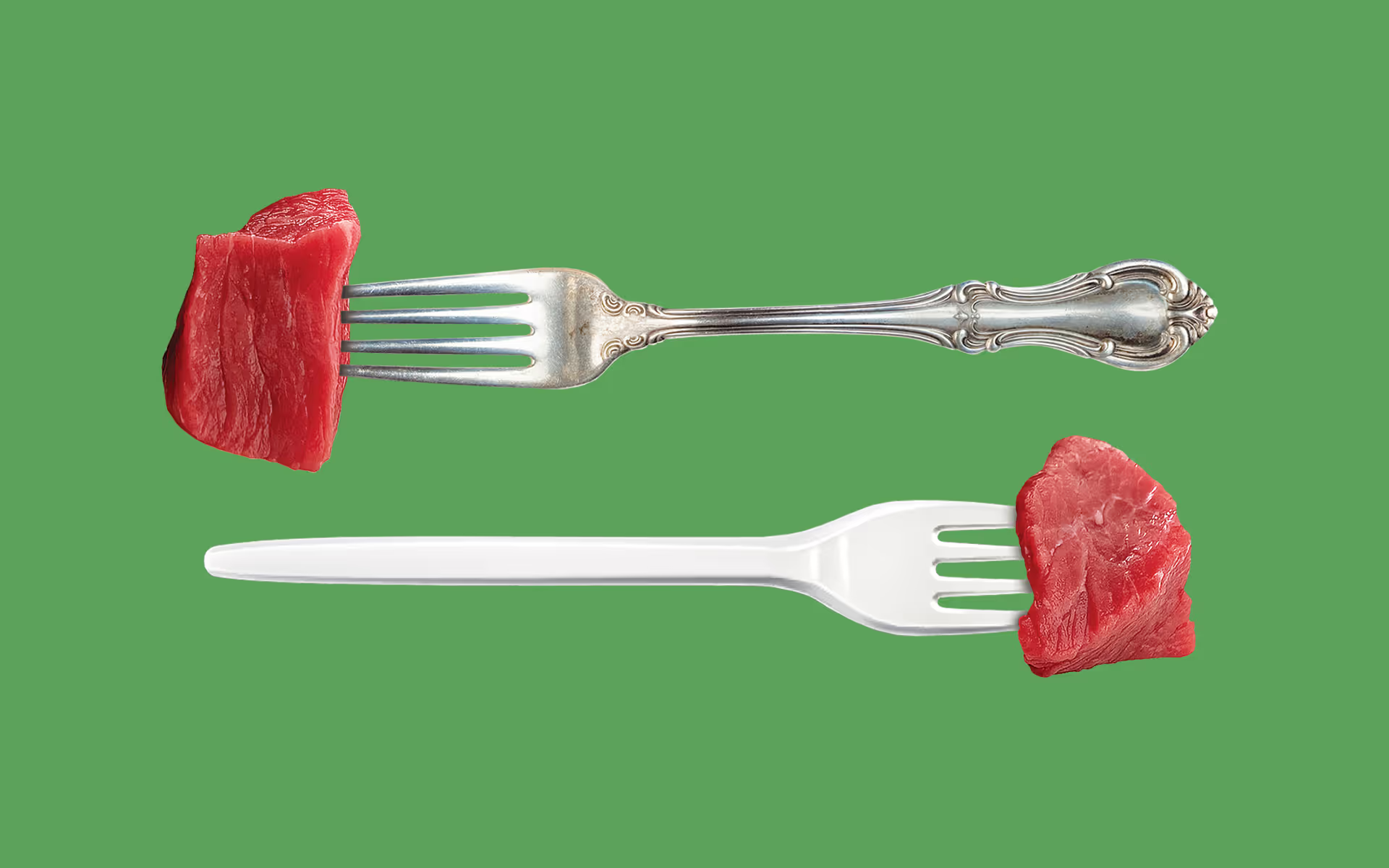Roaming the vast savannas with sweat on their brow having spent hours tracking, the tribesmen finally spot their prey. The animal is exhausted, barely able to run anymore. When the killing blow is cast, it slumps quickly to the floor. The tribesmen then gather around cautiously. When they are certain the animal has finally succumbed to its wounds, they begin a ceremony. They smear the saliva of the animal over their bodies saying grace in appreciation for the sustenance that the being will provide.
It has been shown that humans in general have a natural aversion to killing and doing harm to other creatures. Historically, there are many cases where hunters and those who butcher would follow a purification ceremony to cleanse themselves of their bad juju. The community would take time to give thanks to them and for the food they provided. But as we moved from hunter-gathering to agricultural societies, the number of killings has intensified yet the purification ceremonies have faded into oblivion.
On the other hand, the vast majority of us eat meat by the burgerful every day. The result is over 8 million animals being killed every hour. If we have a natural psychological aversion to doing harm to other creatures, therein lies the conundrum: who does the killing?
All the Lonely People, Where do They All Come From?
Killing animals is a messy business. It is an almost universally unwanted deed in many cultures and societies. But if we love burgers so much, somebody's gotta do it. The act is so reviled that we go as far as to distance those who do the killing. For instance in India, Japan, and Tibet in the past, those who were designated the act of killing were placed in defined social groups and lower-ranked castes. People who do the killing are often cast away from society. How many of us know a person who works in meatpacking? Have you ever conversed with a person who kills every day? They seem to be invisible.
Why do they take the job if they would face stigmatization? Sadly, being of a particular class or rank in rigid class societies is not a choice but a designation since birth. Similarly, if we were to look closer to home, e.g. the United States or Europe, employees of larger slaughterhouses and factory farms are mostly economic migrants from poorer neighboring nations who have taken up the job which the citizens of said nations wouldn’t want to do. This places workers who are already away from home to face further marginalization in a foreign country.
Breaking Bodies
Slaughterhouses are to put it lightly, grueling places to work. Windowless, noisy, the smell of fear and blood in the air, sharp objects and heavy machinery, chemicals of all sorts and on top of that, it is constantly running. This is why working in a slaughterhouse is the most dangerous factory job in the United States with a high potential for injuries, ranging from light to severe.
Let's begin with the minor injuries which can already be permanent. Workers face long hours with very little rest and continuous repetitive motion. These continuous movements can cause the workers to incur injuries causing chronic or lifelong pain.
This is where the elements begin to turn against the body. To keep meat as fresh as possible, the temperatures are kept to almost freezing degrees. When the body is exposed to long hours of chilled environments it may cause frostbite, if the employees are not adequately provided for with proper gear. In many cases where there is not enough work environment oversight or regulation, they are not.
It is extremely noisy, with loud clanking machinery and the constant cries of terrified and confused animals. Long-term exposure to such noises can increase the chances of hearing loss.
The extent of injuries that occur reaches gruesome proportions, from cuts to bruises to amputations and even death. Large animals that are not completely stunned or subdued, thrash around, striking workers. Knives accidentally not stabbing where they should, getting stuck in heavy machinery and hooks.
To add to the bloody cherry on top, there are a lot of chemicals involved. There tends to be an illusion that meat is offered to us raw, untainted and unprocessed, unlike plants and grains which we are told are coated with pesticides and other chemicals. But factory farms and meat are loaded with chemicals. We must take note the various chemicals range from Ammonia, Hydrogen Sulfide, and Particulate Matter.
- Ammonia: high levels of exposure damages the respiratory system. Lower levels of exposure cause irritation and coughing.
- Hydrogen Sulfide: Lower amounts of exposure can cause irritation of the eyes, nose, and throat. Increased exposure leads to further irritation and sickness while high exposure can lead to coma and death.
- Particulate Matter: when dealing with animal matter and waste, blood and feces can cause the employees to get sick with various diseases.
Breaking Minds
"God, that really isn’t a bad-looking animal.’ You may want to pet it. Pigs down on the kill floor have come up to nuzzle me like a puppy. Two minutes later I had to kill them. … I can’t care.” Slaughter House Worker
Just as with the animals who are confined into small spaces, the workers are put side by side and work tirelessly with little to no breaks to maintain the fast pace of the production. ‘’Stickers’’ is the name given to the workers who slit the throat of the animal to bleed it out. They usually work in smaller groups. They are the ones to give the killing blow every few minutes. Too often than not, the animals are still conscious. The repetitive violence and gore they face take a heavy psychological toll on them.
How does one mentally endure such a torturous environment and work? They don’t. Naturally, most people cannot handle it. As much as we like to think they are mentally resilient or psychotically inclined; we just can’t. Because of the psychological taxing nature of the work, the workers subconsciously commit to ‘’psychic numbing’’ to try and dispel some of the emotional distress. Psychic numbing helps us get through the day, especially if we are targets of violence. However, it becomes problematic when it is used in perpetrating violence.
As time goes by, the emotional dissonance eats away at an individual as they struggle to cope with the continuous slaughter. Prolonged desensitization and derealisation eventually manifest themselves in serious psychopathological symptoms. Once gentle people begin to act malignantly towards the animals and towards themselves and people close to them.It’s from here the social impact of the meat industry comes into the picture.
Resulting in workers becoming more aggressive, socially isolated, depressed, and suicidal tendencies. Substance abuse and absenteeism are common among employees. Violence is not confined solely to the workplace; domestic abuse, social alienation, and harm to others extend outside of the factories. There is a noted increase in arrest rates for violent and sexual crimes from employees who work in these factories.
Extensive studies show that workers face a high incidence of PTSD. A rare type of PTSD manifests in slaughterhouse workers in situations where killing is the repetitive action called Perpetration-Induced Traumatic Stress (PITS). In this version of PTSD, workers display similar symptoms as soldiers (and child soldiers) who were sent into combat situations.
There is very little to no support for them. Due to their foreign status, they are less likely to have a social security and healthcare net. Finding psychological assistance when needed is difficult and out of reach monetarily. Furthermore, the work is low-paid, meaning any private help is usually out of the question. This perpetuates a cycle of pain and social isolation for the individual and the communities.
The Grinding Truth
We may think those who chose to work in these slaughterhouses have predispositions of killing. However, as it has been shown in research, almost all of them do not take pleasure in their actions. They are the human victims of this extremely flawed and callous food system, within an industry intentionally concealing itself from public scrutiny. Most of us are oblivious to the knowledge of the countless atrocities and ceaseless violence which are required to sustain the ‘’way things are’’.
The psychological and physical violence extends to the people who work there and we tend to ignore that. The rights of their body and their mind are continuously ignored and exploited. We argue over how Amazon treats their workers, yet we continue to buy from Amazon. But to the contrary, we continue to eat meat but shun the slaughterhouse worker. The system of abuse does not discriminate between species.
In tribal times the killers would be welcomed back into society, cleansed and appreciated. The stigma was removed and there was integration. As time went by, as the infrastructure and the slaughterhouses expanded, these customs slowly faded and those who did the killing were cast away. Despite a high level of intensity, scale and the conscious effort to distance the killing from the public eye, the violence seeps into the fabric of society. The range of victims extends far beyond walls of the slaughterhouse as the anguish seeps into homes and communities. A moment on the lips, a lifetime of trauma.






